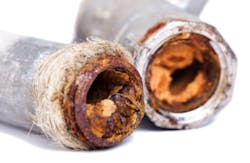OXFORD, Pa. — The water used for industry purposes can contain suspended and dissolved solids, and industrial applications reuse water that could be highly concentrated in iron scale, silicate and calcium carbonate, potentially causing limescale build up and rust.
In cases where there is more dissolved oxygen in water, iron can easily become oxidized and grow into rust, and additionally, this iron is a catalysis continuously speeding up the anode action so rust develops inside the pipe.
“Generally, this is called red rust but electronic water treatment (EWT) devices such as Scalewatcher changes it into black rust shown as [3Fe2O3 · nH2 O + e- ⇒ 2Fe3O4 + 1/2O2 + 3nH2O],” said Scalewatcher North America Inc. President Jan De Baat Doelman. “This cathode action gradually changes red rust into brown and then into dark brown rust (Fe3O4). Called magnetite, it makes it possible to extend the life span of pipe material by forming a film on the inside of the pipe wall which prevents rust growth. Red rust accelerates scale deposition, but the transformation into black rust by EWT means that the red rust is removed together with the scale in the water flow.”
You can find the entire downloadable release here.
